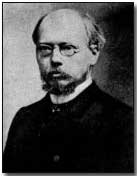Primary Documents - Count Georg von Hertling on the Brest-Litovsk Peace Treaty, 19 March 1918
 Reproduced below is the
text of German Chancellor
Count Georg von Hertling's
address to the German Reichstag on 19 March 1918. Count Hertling's
speech concerned the signing of the Brest-Litovsk peace treaty with Russia
some 16 days earlier - a settlement highly advantageous to Germany and
only
agreed by Russia once it became clear to the country's Bolshevik
leaders that the Russian Army was incapable of further fighting.
Reproduced below is the
text of German Chancellor
Count Georg von Hertling's
address to the German Reichstag on 19 March 1918. Count Hertling's
speech concerned the signing of the Brest-Litovsk peace treaty with Russia
some 16 days earlier - a settlement highly advantageous to Germany and
only
agreed by Russia once it became clear to the country's Bolshevik
leaders that the Russian Army was incapable of further fighting.
The treaty had been earlier openly opposed by Trotsky; so frustrated was he at what he regarded the Central Powers' annexationist stance that he walked out of the peace conference on 10 February 1918, vowing that peace could be effected without a treaty. Ultimately however - and in the face of renewed German-led military incursions into Russia - Russia reluctantly signed the Brest-Litovsk treaty on 3 March 1918.
Count Hertling's speech to the Reichstag (below) was, in the circumstances, recognisably victorious in tone.
Click here to read the reaction of Austro-Hungarian Foreign Minister Count Czernin to news of the settlement.
Count Georg von Hertling's Address to the Reichstag on the Brest-Litovsk Peace Treaty, 19 March 2004
Hypocrisy has become second nature to the enemy, whose untruthfulness is made worse by its brutality.
Every attempt at calm explanation and every real deliberation must fail, when the enemy, at the very moment he is laying a heavy hand on a neutral country, dares to speak of a policy guided by complete unselfishness.
The treaty with Russia contains no conditions disgraceful to Russia, if the provinces breaking away from Russia say it is in accordance with their own wish and the wish is accepted by Russia.
Courland and Lithuania have long been united to Germany politically, economically, and militarily. Livonia and Esthonia are the eastern frontier fixed by the treaty, but we hope that they also will have close and friendly relations with Germany; not, however, to the exclusion of their friendly relations with Russia.
Poland is not mentioned in the treaty, and we shall endeavour to see if it is possible to live in stable and good-neighbourly relations with the new State.
If the Reichstag adopts the treaty, peace on the whole eastern front will be restored, as I announced February 24th; but among the Entente Powers there is not the least inclination to finish this terrible war. The responsibility for bloodshed will be upon the heads of those who wish continuation of the bloodshed.
Russia proposed that all the belligerents enter into peace negotiations. We and our allies accepted the proposals and sent delegates to Brest-Litovsk. The powers until then allied with Russia remained aloof.
The course of the negotiations is known to you. You remember the endless speeches, which were intended not so much for the delegates there assembled as for the public at large, and which caused the desired goal of an understanding to recede into the distance.
You remember the repeated interruptions, the rupture and the resumption of the negotiations. The point had been reached where "yes" or "no" had to be said, and on March 3rd peace was concluded at Brest-Litovsk. On March 16th it was ratified by a competent assembly at Moscow.
If in the telegram from Washington it was thought fit to express to the Congress assembled at Moscow the sympathy of the United States at a moment when, as it says, the German power obtruded itself, in order to bring success to the battle for freedom, then I put that calmly aside with the rest.
We have not for a moment contemplated, and do not contemplate, opposing the justified wishes and endeavour of Russia to be liberated. As I said on November 29th, we desire for that sorely tried land a speedy return to a peaceful and orderly state of affairs, and we deeply deplore the terrible conditions which have made their appearance in many places.
The Russian treaty contains no conditions whatever which dishonour Russia, no mention of oppressive war indemnities, no forcible appropriations of Russian territory.
A number of the border States have severed their connection with the Russian State in accordance with their own will, which was recognized by Russia.
In regard to these States we adopt the standpoint formerly expressed by me, that under the mighty protection of the German Empire they can give themselves political form corresponding with their situation and the tendency of their kultur, while at the same time, of course, we are safeguarding our own interests.
Source: Source Records of the Great War, Vol. VI, ed. Charles F. Horne, National Alumni 1923
'Alleyman' was British slang for a German soldier.
- Did you know?
